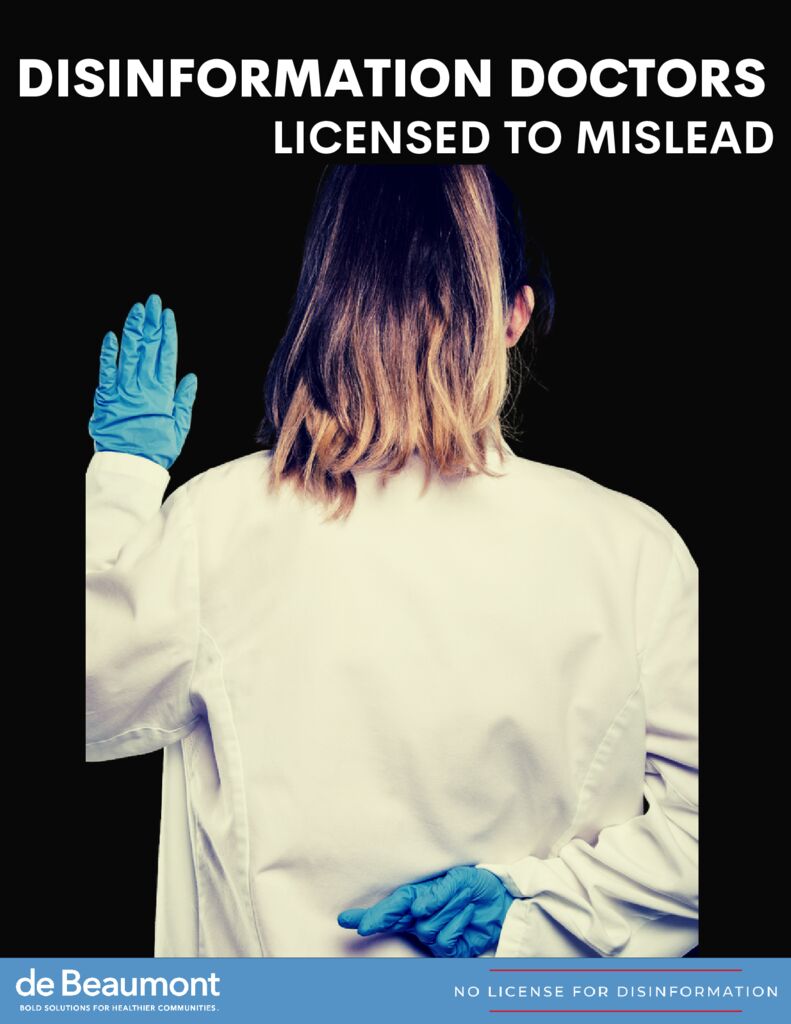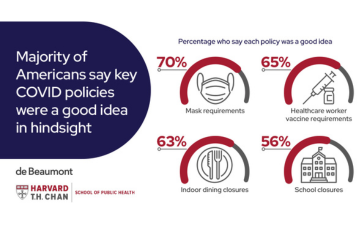Poll: 9 in 10 Americans say doctors should be held accountable for COVID-19 disinformation
A new report released today urges state medical licensing bodies to investigate doctors who are deliberately spreading misleading or false COVID-19 information. And an overwhelming majority of the public agree: Nine in 10 Americans say doctors who intentionally spread misinformation about COVID-19 should be held accountable, according to new polling conducted by Morning Consult for the de Beaumont Foundation.
In the report, Disinformation Doctors: Licensed to Mislead, public health advocates No License for Disinformation and the de Beaumont Foundation offer an expert analysis on a path forward to counter doctors’ attacks on science and medicine and prevent unnecessary COVID-19 deaths.
The report argues that state medical boards have the grounds under states’ Medical Practice Acts to take disciplinary action against doctors who are deliberately spreading disinformation. But almost two years into the pandemic, they have largely failed to take action.
“Misinformation is a public health crisis, and ‘disinformation doctors’ are making it worse,” said Brian C. Castrucci, DrPH, president and chief executive officer of the de Beaumont Foundation. “Lives are at stake. State medical boards have the ability and the responsibility to counter the spread of misinformation by taking real action against the biggest offenders.”
“A small but vocal minority of physicians are exploiting the credibility that comes with their medical licenses to disseminate disinformation to both their patients and the public,” said Nick Sawyer, MD, MBA, FACEP, an emergency room physician and executive director of No License for Disinformation. “The trust that our patients and the public instill in doctors is paramount; and state medical boards are undermining that trust by failing to hold these doctors accountable for their dangerous and deceptive actions.”
Misinformation is a public health crisis, and ‘disinformation doctors’ are making it worse.
Earlier this year, the Federation of State Medical Boards issued a rare public warning that physicians who spread COVID-19-related misinformation risk disciplinary action. But despite the Federation’s strongly worded guidance, in the five months since the statement was issued, only a handful of doctors have faced any consequences.
Misinformation and disinformation have been widely reported throughout the pandemic. The Disinformation Doctors report details examples of statements by licensed physicians who are intentionally and publicly spreading COVID-19 disinformation in social media posts, websites, live and virtual conferences, podcasts, interviews, news reports and public testimony – and without apparent consequence.
In a recent survey of the Federation of State Medical Boards’ 70 state medical board members, more than two-thirds reported an uptick in complaints, and yet just 12 medical boards reported taking any disciplinary action against a doctor for spreading “false or misleading information.” The Federation has not clarified what disciplinary actions have been taken.
In response to this overall failure to act, the Disinformation Doctors report outlines the following concrete actions that should be taken by state medical boards and the regulatory entities that oversee them to prevent doctors from continuing to spread dangerous COVID-related disinformation:
- Deliver sunlight and accountability: Increase transparency and improve oversight.
- End the complacency: Medical boards should be explicitly authorized to take proactive action in the interest of public health.
- Create a uniform reporting process: Standardize entities required to report to state medical boards.
- Give complaints the urgency they deserve: Standardize expedited timelines to process complaints in the domain of public health.
- Bring disclaimers into the 21st century: Boards should establish, enhance, and enforce disclaimers around non-medical advice, particularly for digital communications.
- Work with watchdogs: Curate public-private partnerships for proactive monitoring and investigation.
- Compel detailed disclosures: Establish consistent public reporting requirements.
Download Disinformation Doctors: Licensed to Mislead.






